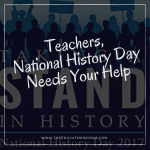 This past week marked the thirteenth anniversary of 9/11. My first and second graders haven’t a clue about what this terrorist attack on the United States meant. Some adults still don’t realize it either, for that matter.
This past week marked the thirteenth anniversary of 9/11. My first and second graders haven’t a clue about what this terrorist attack on the United States meant. Some adults still don’t realize it either, for that matter.
Sometimes it’s difficult for me to remember that these kids are only six and seven. I liken it to the idea of the JFK assassination when I was growing up. I wasn’t alive at the time that JFK was assassinated, but the stories I heard from my parents and teachers and the impact it had on their lives definitely showed me the impact of the event. One of the common phrases I heard when anyone was talking about this incident was, “I remember exactly where I was when I heard the news…” As a young student I couldn’t really wrap my head around an event that was so life-altering for seemingly everyone who remembered it.
That is until I experienced 9/11. And I remember exactly where I was when that first plane hit.
Trying to pass on the importance of this event to students who have no frame of reference to base it on is very difficult. But it’s also very necessary. We need to be able to make these types of events stick with our students.
There are two lessons that I want my young students to take with them, based on the facts about 9/11, or any awful situation that has occurred in our history for that matter. I want them to realize that the choices people make- the choices THEY make- can have a lasting impact on not only everyone around them, but can also be far-reaching over the course of time. I also want them to understand that when bad things happen, they don’t have to allow those bad things to define them.
The world that our students are growing up in is ever-evolving. They are used to instant gratification, not always being required to take responsibility for their actions and a complete lack of consequences, to name a few. Growing up with these mindsets can create the lack of empathy that we see so much of in our classrooms. This lack of empathy leads to so many additional falsehoods in our students’ lives, and follows them into adulthood creating even more challenges for them and the people around them.
I never did like history. I always joked about history repeating itself, saying that I would catch it the next time it came around. As an adult, I now wish I would have realized the importance of it. I wish I would have paid more attention to how it not only shaped our past, but how it also shapes our future. And as a teacher I sure do not want to pass on this mistake to my students. Students of all ages need to understand the importance of historical events, and we definitely do not need to be skipping over our youngest students thinking that they wouldn’t understand or that there isn’t time for it in our day.
How do you implement social studies and history into your day?




